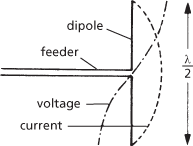1. Two equal and opposite charges that are separated by a distance. The dipole moment is the product of either charge and the distance between them. Some molecules behave as dipoles and measurement of the dipole moments can often provide information regarding the configuration of the molecule.
2. An aerial commonly used for frequencies below 30 megahertz. It consists of a horizontal rod, fed or tapped at its centre. It may be half a wavelength or a full wavelength long.
1. A system of two equal and opposite closely spaced electric charges (electric dipole) or magnetic poles (magnetic dipole).
2. A dipole antenna.
3. Any system having a bipolar structure about an axis of symmetry (e.g. a dipole field, or dipole anisotropy).
A pair of separated opposite electric charges. The dipole moment (symbol μ) is the product of the positive charge and the distance between the charges. Dipole moments are often stated in debyes; the SI unit is the coulomb metre. In a diatomic molecule, such as HCl, the dipole moment is a measure of the polar nature of the bond (see polar molecule); i.e. the extent to which the average electron charge is displaced towards one atom (in the case of HCl, the electrons are attracted towards the more electronegative chlorine atom). In a polyatomic molecule, the dipole moment is the vector sum of the dipole moments of the individual bonds. In a symmetrical molecule, such as tetrachloromethane (CCl4), there is no overall dipole moment, although the individual C-Cl bonds are polar.
1. (electric dipole; doublet) A system of two equal and opposite charges very close together. A uniform electric field produces a torque that aligns the dipole along the field without translation. The product of one of the charges and the distance between them is the dipole moment (symbol: p). Dipole moment is related to the electric field strength, E, and the torque, T, by
Some molecules have the effective centres of positive and negative charges permanently separated; these are termed dipole molecules. Some molecules have an induced dipole moment when the presence of a field causes the charge centres to polarize. Compare magnetic moment.
2. (dipole antenna) An antenna commonly used for radiofrequencies below 3 gigahertz. It consists of a centre-fed open antenna excited in such a way that the standing wave of current is symmetrical about the mid-point of the antenna. There are several different types: a half-wave dipole has a length equal to half the wavelength, λ (see diagram); a full-wave dipole has a length of one wavelength; a folded dipole consists of two parallel half-wave dipoles separated by a small fraction of the wavelength, connected at their outer ends, and fed at the centre of one of the dipoles; a multiple folded dipole consists of more than two parallel half-wave dipoles.

Voltage and current distribution in half-wave dipole
- magnetoresistance
- magnetoresistive random access memory
- magnetosheath
- magnetosphere
- Magnetospheric Multiscale Mission
- magnetostratigraphic timescale
- magnetostratigraphy
- magnetostriction
- magnetostrictive tablet
- magnetotail
- magnetotelluric sounding
- magnetozone
- magnetron
- magnetron effect
- magnex process
- magnification
- magnifying power
- magnitude
- magnitude, earthquake
- magnitude of an eclipse
- magnitude(of a vector)
- magnitude response
- Magnolia
- Magnoliophyta
- magnon